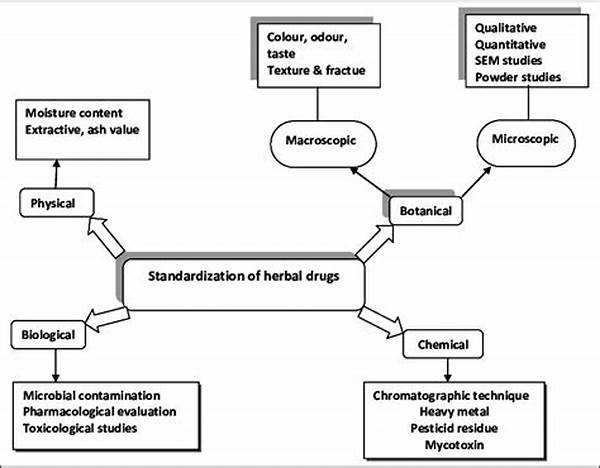In recent years, there has been a growing interest in the use of herbal medicines alongside conventional pharmaceuticals. While herbs have been used for centuries in traditional medicine, their interaction with modern medications can sometimes lead to unintended consequences. This article explores the implications and considerations of using herbs that may affect medication efficacy.
Read Now : Holistic Health With Medicinal Plants
Understanding the Impact of Herbs on Medication Efficacy
Herbs, while natural, are complex substances that possess active compounds capable of interacting with pharmaceuticals. The potential for herbs affecting medication efficacy arises when these interactions lead to altered drug absorption, metabolism, or excretion. Such interactions may either potentiate or diminish the intended effects of a medication or, in some cases, lead to adverse reactions. As the use of herbal supplements becomes more prevalent, it is imperative for healthcare professionals and patients to be aware of these interactions to ensure safe and effective treatment outcomes. Research has shown that certain herbs, such as St. John’s Wort, can significantly impact the efficacy of medications like antidepressants, anticoagulants, and birth control pills. This underscores the need for comprehensive assessments of herbal and pharmaceutical regimen by healthcare providers to optimize patient care. Awareness and education on herbs affecting medication efficacy are vital components in the integration of herbal and pharmaceutical therapies.
Key Interactions Between Herbs and Pharmaceuticals
1. St. John’s Wort: Known for treating depression, it is notorious for reducing the efficacy of various medications, including oral contraceptives and anticoagulants.
2. Ginkgo Biloba: Commonly used for cognitive enhancement, it may interfere with antiplatelet and anticoagulant medications, thus affecting medication efficacy.
3. Ginseng: Often used for its energy-boosting properties, ginseng can decrease the effectiveness of blood pressure medications.
4. Garlic: As a supplement for cardiovascular health, garlic can amplify the effects of anticoagulants, potentially leading to increased bleeding risks.
5. Echinacea: Popular for immune support, it may interact with immunosuppressants, thereby affecting medication efficacy.
Read Now : Cultural Herbal Healing Traditions
Considerations for Patients and Healthcare Providers
When considering the use of herbs that may affect medication efficacy, both patients and healthcare providers must engage in open, informed dialogues. It is crucial to maintain an up-to-date list of all medications and supplements a patient is using. Patients should be encouraged to discuss any herbal products they are taking or considering with their healthcare providers. This is particularly important for individuals with complex medical conditions, those on multiple medications, or those with chronic illnesses. Furthermore, healthcare providers should prioritize staying informed about current research on herb-drug interactions to provide evidence-based guidance. Understanding herbs affecting medication efficacy can empower healthcare providers to tailor treatment plans and prevent potentially harmful interactions.
A Closer Look at Specific Herbs Affecting Medication Efficacy
Understanding these herbs affecting medication efficacy can help guide appropriate usage and decision-making, ensuring safety and efficacy in treatment regimens.
Herb-Drug Interaction Challenges and Considerations
Herb-drug interactions are a critical consideration in the realm of pharmacotherapy. Herbs such as St. John’s Wort, Ginkgo Biloba, and others have shown potential to alter the pharmacokinetics and pharmacodynamics of various medications, thereby complicating treatment regimens. The concept of herbs affecting medication efficacy is paramount in ensuring that patients achieve optimal therapeutic outcomes without experiencing adverse effects. The subtleties of these interactions necessitate a patient-specific approach, where healthcare providers assess individual risk factors and consider the comprehensive medication profile of each patient. Regular updates in clinical guidelines regarding herbs affecting medication efficacy are essential to inform practice and protect patient health.
Summary of the Importance of Herbs Affecting Medication Efficacy
The intricate interplay between herbs and pharmaceuticals necessitates a thorough understanding of potential interactions that may impact therapeutic efficacy and patient safety. Herbs like St. John’s Wort and Ginkgo Biloba present tangible risks by modifying drug metabolism and blood chemistry. Recognizing herbs affecting medication efficacy is critical for healthcare providers in crafting effective treatment plans. Patients too, play a significant role by maintaining transparency in their medication and supplement use. The breadth of potential interactions underscores the importance of tailored, informed medical advice. Investing in further research on herbs affecting medication efficacy will provide valuable insights to refine clinical guidelines and enhance patient care. Only through the synergy of informed healthcare providers, educated patients, and ongoing research can the full potential of combined herbal and pharmacological treatments be realized.
